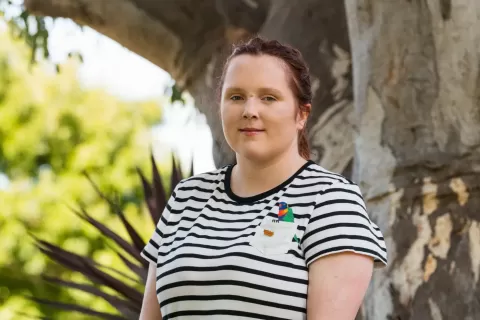
When Ashleigh Keating worked as a primary school teachers’ aide, she would very rarely tell the teachers she supported she was autistic, even though her students often had the same disability.
Her reluctance was based on widespread ignorance and stigma around autism. She observed teachers did not have high expectations of autistic students, bad behaviour was blamed on autism and if a staff member was a “little bit of an interesting character”, it was assumed they must be autistic.
Keating had been burnt before. When she was 12, teachers disclosed her autism to her classmates without her permission after she had a meltdown. “I remember a comment along the lines of: ‘I always knew you were weird, but I couldn’t put my finger on it. But now I know why’,” she recalls.
Dr Abigail Love, lead researcher at the Aspect Research Centre for Autism Practice, said autistic people often had to weigh up the potential consequences of disclosing they are autistic, such as losing their job or dealing with negative reactions.
Love led a team of researchers who followed 36 autistic adults across Australia for two months to examine why and how they disclosed they were autistic and the reactions they experienced.
Some reported positive reactions. They said disclosing they were autistic enabled them to ask for support in the workplace, such as a quiet space or dim lights, and made them feel they could be themselves and stop “masking”. (Masking can involve suppressing behaviours – such as hand flapping or rocking which help reduce anxiety or decrease sensory overload – or developing complex social scripts to try to fit in be more like the people around them.)
However, others had negative experiences and felt they were targeted and treated differently after telling people they were autistic.
“A big one was about shock and dismay,” Love says. “A lot of participants said people would say ‘There’s no way you are autistic’, or ‘You don’t look autistic’. One person was complimented [and told] they should feel so proud because people would never know they were autistic. At times, they find they’re discriminated against, sometimes losing jobs and relationships.”
Keating, who was one of the research participants, now works in disability advocacy and feels comfortable disclosing she is autistic.
But recently, when she told a physiotherapist, she says she was treated like a child. “Don’t treat autistics like we are children … just because we have a disability doesn’t mean we can’t comprehend things, it just means we do things differently.”

Sarah AlKamraikhi says telling people she is autistic can be stressful.Credit:Glenn Hunt
Sarah AlKamraikhi, a customer service representative who was diagnosed with autism a year ago at the age of 39, said telling people could be “really stressful and a bit scary”.
AlKamraikhi, who was also involved in the research project, mostly receives blank looks when she tells people she is autistic. “It might be surprise, or it might be just a lack of understanding of what the broader term of autism means outside of people with very high support needs. You have that media representation of that little boy who is non-verbal and has meltdowns.”
When she does tell people, AlKamraikhi often feels compelled to educate them. “You do feel the need to explain, and then you end up over-explaining, and it just sometimes ends up being more stressful than if you just hadn’t said anything,” she says.
AlKamraikhi recently had a negative experience in a hospital when a nurse told her that “autism really covers a broad spectrum of things”. “She was very dismissive and refused to comment further on it after that,” she says. AlKamraikhi felt she was being accused of trying to get attention.
The study showed participants sometimes found it easier not to reveal they were autistic, even though this meant they would not receive support and be put at increased the risk of mental health concerns.
“Work has to be done by the broader community to continue making a more inclusive society where autistic people can feel safe disclosing if they choose to,” the study says.
from https://www.smh.com.au/national/you-don-t-look-autistic-what-not-to-say-if-someone-discloses-their-autism-20230214-p5cka6.html